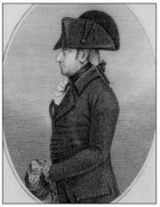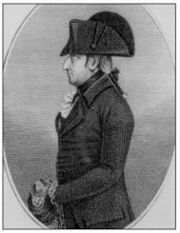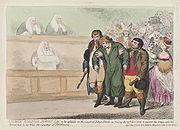
Andrew Robinson Stoney
Encyclopedia

Anglo-Irish
Anglo-Irish was a term used primarily in the 19th and early 20th centuries to identify a privileged social class in Ireland, whose members were the descendants and successors of the Protestant Ascendancy, mostly belonging to the Church of Ireland, which was the established church of Ireland until...
adventurer who married Mary Eleanor Bowes
Mary Eleanor Bowes
Mary Eleanor Bowes, Countess of Strathmore and Kinghorne , known as "The Unhappy Countess", was the daughter and heiress of George Bowes...
, the Countess of Strathmore. She became known as "The Unhappy Countess" due to their tempestuous relationship, which ended in scandal. The story of Stoney Bowes and the Countess of Strathmore was fictionalized by William Makepeace Thackeray
William Makepeace Thackeray
William Makepeace Thackeray was an English novelist of the 19th century. He was famous for his satirical works, particularly Vanity Fair, a panoramic portrait of English society.-Biography:...
in The Luck of Barry Lyndon
The Luck of Barry Lyndon
The Luck of Barry Lyndon is a picaresque novel by William Makepeace Thackeray, first published in serial form in 1844, about a member of the Irish gentry trying to become a member of the English aristocracy...
. Stanley Kubrick
Stanley Kubrick
Stanley Kubrick was an American film director, writer, producer, and photographer who lived in England during most of the last four decades of his career...
later adapted the novel into the 1975 award-winning film Barry Lyndon
Barry Lyndon
Barry Lyndon is a 1975 British-American period romantic war film produced, written, and directed by Stanley Kubrick based on the 1844 novel The Luck of Barry Lyndon by William Makepeace Thackeray which recounts the exploits of an 18th century Irish adventurer...
.
Marriage to Mary Eleanor Bowes
Mary Eleanor Bowes, the widowed Countess of Strathmore and Kinghorne, was engaged to her lover, George GrayGeorge Gray
George Gray may refer to:* George Gray, founder of the Hawkhurst Gang* George Gray , member of the Australian House of Representatives...
, in the summer of 1777 when she met the charming and wily Anglo-Irish adventurer, Andrew Robinson Stoney, who manipulated his way into her household and her bed. Calling himself 'Captain' Stoney — although he was in reality a mere lieutenant in the British Army — he insisted on fighting a duel
Duel
A duel is an arranged engagement in combat between two individuals, with matched weapons in accordance with agreed-upon rules.Duels in this form were chiefly practised in Early Modern Europe, with precedents in the medieval code of chivalry, and continued into the modern period especially among...
in Mary's honour with the editor of the Morning Post newspaper which had published scurrilous articles about her private life. In fact, he had himself written the articles that criticised her, as well as those defending her; and the duel between Stoney and the newspaper's editor was probably staged. Pretending to be mortally wounded in the duel, Stoney persuaded the countess as his dying wish to marry him. He was carried to the altar on a stretcher for his marriage to the Countess on January 17, 1777. Staging a miraculous recovery immediately after the marriage, Stoney took his wife's surname (as stipulated by her father's will) and was styled Andrew Robinson Stoney Bowes. He served as High Sheriff of Durham in 1780 and was elected MP for Newcastle upon Tyne later the same year serving until he lost the next election in 1784.
Stoney's first wife, Hannah, was the daughter of William Newton of Burnopfield
Burnopfield
Burnopfield is a village in County Durham, in England. It is situated north of Stanley, close to the River Derwent and is 564 feet above sea level.A village with local school, churches and newsagents...
. It was widely believed that Stoney Bowes had caused her death in order to assume her inheritance. After his marriage to the Countess, he behaved brutally towards her. When he discovered that she had secretly made a pre-nuptial agreement safeguarding the profits of her estate for her own use, he forced her to sign a revocation handing control to him. Among other outrages, he imprisoned her in her own house, and forced her and one of her daughters to go into exile
Exile
Exile means to be away from one's home , while either being explicitly refused permission to return and/or being threatened with imprisonment or death upon return...
in Paris. They returned after a writ had been served on him. At the same time he rape
Rape
Rape is a type of sexual assault usually involving sexual intercourse, which is initiated by one or more persons against another person without that person's consent. The act may be carried out by physical force, coercion, abuse of authority or with a person who is incapable of valid consent. The...
d the maids, invited prostitutes into the home and fathered numerous illegitimate children.
Mary Eleanor gave birth in August 1777 to a daughter Mary, most probably the child of her prior liaison with Gray. Bowes took the girl as his own child and the birth was registered as November 1777 but he later broadcast her illegitimacy. The couple had a son, William Johnstone Bowes, who was born on May 8, 1782.
Finally, in 1785, with the help of loyal maids, the countess managed to escape his custody and filed for divorce
Divorce
Divorce is the final termination of a marital union, canceling the legal duties and responsibilities of marriage and dissolving the bonds of matrimony between the parties...
through the ecclesiastical courts. Having lost the first round of this courtroom battle, Stoney Bowes abducted Mary with the help of a gang of accomplices, carried her off to the north country, threatened to rape and to kill her, gagged and beat her, and carried her around the countryside on horseback in one of the coldest spells of the coldest winter of the century. The country was alerted, and Stoney Bowes was eventually arrested and the countess rescued.

Many years later, Thackeray learned of Stoney Bowes' life story from the Countess's grandson John Bowes and used it in his novel The Luck of Barry Lyndon
The Luck of Barry Lyndon
The Luck of Barry Lyndon is a picaresque novel by William Makepeace Thackeray, first published in serial form in 1844, about a member of the Irish gentry trying to become a member of the English aristocracy...
.

